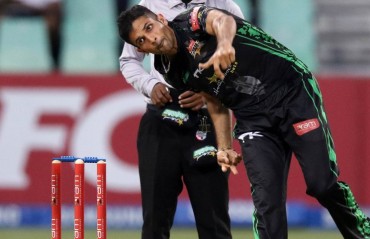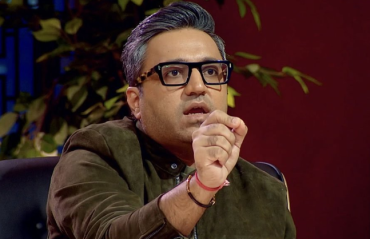FISTS OF FURY: True champion in and off the ring
- By Vinay Kanchan
- June 04, 2016
 IT IS THE OPENING CEREMONY at the Atlanta Olympics in 1996. The torch has entered the stadium, and the cauldron containing the flame, which will burn through the games, has to be lit. Usually this final honor is bestowed upon a sportsperson with truly outstanding credentials. And sure enough when the crowd glimpses the special person chosen for this task, a roar erupts.
IT IS THE OPENING CEREMONY at the Atlanta Olympics in 1996. The torch has entered the stadium, and the cauldron containing the flame, which will burn through the games, has to be lit. Usually this final honor is bestowed upon a sportsperson with truly outstanding credentials. And sure enough when the crowd glimpses the special person chosen for this task, a roar erupts.
He struggles a bit in lighting the flame. His Parkinson's-ravaged hands are trembling and uncoordinated. Nearly every eye in the stadium is moist. They know that only a few decades ago those hands were moving at lightning speed. Landing dynamite punches from which there was no coming back.
Those hands belong to the greatest boxer ever, Muhammad Ali.
Born Cassius Clay, he has had anything but a quiet existence on planet Earth. Opinionated and controversial, like few other sportsmen before him, Ali grabbed the attention of people with his words and deeds.
He won the light heavyweight boxing gold at the Rome Olympics in 1960. Only to later throw it into the Ohio River, when he was apparently denied service at a 'whites only' restaurant. In 1964 Cassius Clay became Muhammad Ali, en route to a conversion to Islam. He was vehemently vocal in his opposition to the Vietnam War, and refused to be drafted into the US army. This decision was to cost him nearly four years of ring time.
But Ali returned with aplomb!
By the end his career he had regained the boxing heavyweight title of the world an unprecedented three times. He won numerous other accolades as well. He was crowned 'Sportsman of the century' by Sports Illustrated, and also named 'Sports personality of the century' by the BBC.
However, it is the legacy of Ali which delivers the real punch.
He was a trailblazing sportsman in every sense of the word. He prodded and provoked, he changed things. And boxing was not the only language he used to communicate in.
Repositioning a sport
The greatest contribution of Ali to boxing was that he began to show spectators that boxing could also be an art form.
Describing his own style as one that 'floats like a butterfly and stings like a bee', Ali suddenly made boxing look balletic and cerebral at the same time.
His opinionated nature, his effervescent personality, and his memorable interactions with the media, all went a long way in giving boxing an alluring panache.
Millions across the world, who otherwise never gave boxing headlines a second glance, suddenly found a reason to get cued in. For most, Ali transformed their relation with the sport, from one of disinterest to passionate involvement. He became the very face of boxing.
Winning before landing the punch
The old adage goes 'everything is fair, in love and war'. Given that there is very little love in boxing, Ali realized the advantage of using all means to win the war of the bout. He was one of the first to understand that the tongue can deliver lethal knockouts as well.
Few sportsmen in history have used the media to their advantage as well as Ali.
Ali appreciated quite early in his career that for all the muscle and punching power associated with boxing, it was essentially a sport played out in the mind. And that an upper hand gained before a fight could score precious points in his favor. He was practicing psychological warfare before it became the 'in thing' in corporate circles.
Ali was probably one of the pioneers of mind games in competitive sport.
Initially he caught the attention of everybody, especially his opponents, by brashly predicting in what round he would knock them out. Amazingly, those predictions began proving right. He had realized the inherent value of giving the competition something more to think about.
His pre-match quotes were legendary. He remains, by some considerable distance, the most quotable sportsperson in history.
Before one fight, he told his rival at a press conference:
"If you had even dreamt of beating me, you should wake up and apologize."
In the pre-match build up against the defending champion Sonny Liston, Ali (then still Cassius Clay) had said in his inimitable style:
"If you like to lose your money, be a fool and bet on Sonny. But if you want to have a good day, bet on Clay."
A believer in the power of affirmations, Ali habitually said 'I am the greatest' at every single opportunity. This at a time when sportsmen blowing their own trumpet was literally unheard of. The repeated articulation of that statement probably instilled an unshakeable belief in Ali regarding his own ability. It also surely must have seeded doubts in his opponents' minds about their chances of winning against someone who was so obviously confident.
This kind of approach is fraught with the danger of one falling flat on his face. But Ali was one who could certainly walk his talk. As he himself said: "It's not bragging, if you can pull it off."
Every battle is won before it is fought
Muhammad Ali added to the colors of the canvas of boxing with some very distinctive strokes of his own.
The phantom punch, the Ali shuffle, and the Rope-A-Dope are three new terms which he contributed that will forever bring back his memories in conversations.
'The phantom punch' was the one that felled Liston, in Ali's second fight with him. It was so fast that no one apparently saw it. It had shades of controversy associated with it, in terms of whether it was even thrown in the first place.
'The Ali shuffle' was a dazzling move in which he literally would dance, shuffling his feet at very high speed, and sometimes land a devastating blow at the end of this maneuver. It was something that certainly added loads of flair to the sport itself.
'The Rope-A-Dope' was his legendary defense strategy against Foreman, where he lay on the ropes to invite punishment onto himself, something that only a very brave man could have even thought of.
Boxing, once seen as low on mind but hard on fist suddenly, post Ali, found it easy to make lateral entries into any kind of conversation. These concepts broadened its cultural scope and influence.
Rising again after failure
The defining quality of a true champion lies in how quickly he can pick himself up, after being knocked down. This is where Ali had few peers. He had this phoenix-like quality of resurrecting himself, just when people had begun to write him off.
And this is the most important lesson from the champion's life.
That while circumstances might conspire to put one down, true strength and courage lies in having the belief to get back on one's feet again.
Ali was stripped of his boxing title for refusing to go to Vietnam. He chose to take that stand because he 'had no quarrel with the Viet Cong', and that it went against his religious beliefs—to wage war without reason. Even when he was told that he would not be doing any actual fighting, and would be on the front more in a motivational capacity, he stuck to his stand. He knew that the consequences could be jail, and an adieu to a further career in boxing.
He subsequently lost his title and his boxing license. For a long time he fought a legal battle to be allowed to box again. Till the Supreme Court ruled in his favor four years later. Through those long years, even when he did not box, Ali never lost the staunch belief that he was the very best.
After losing to Joe Frazier, in a bloody battle, Ali was up the very next day asking for a rematch. The same thing happened when he unexpectedly lost to Ken Norton, a fight which he fought for the larger part with a broken jaw.
In early 1978, he lost a title fight to Leon Spinks. That very night Ali began training again, running till he was exhausted. All through muttering 'got to get my title back' with fiery determination. In six months’ time he beat Spinks in the rematch, to regain the heavyweight title for the third time, becoming the very first man to do so in history.
Even Parkinson's disease had not been able to stop Ali. A pale shadow of his fast talking, fast moving self, Ali still found the resolve to make a difference by working on numerous humanitarian causes across the world.
Champion Forever
In every sense of the word he remained a champion, who refused to be knocked down by the circumstances. He was a man who loved proving people wrong, especially when they begin to write him off.
Ali stood out from the very first moment he set foot in the ring. He never tried to blend in. He wanted to carve his own way. He had the drive to reach the summit. And he never doubted his own ability, during that arduous climb.
The story of Muhammad Ali is beyond the realms of boxing.
It is the saga of a champion who inspired generations, and will continue to do so!
Abridged from the best-selling book 'Lessons from the Playground' by Vinay Kanchan















